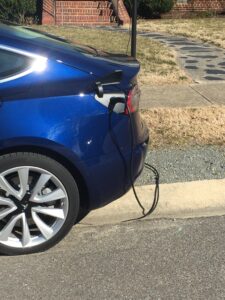 by Bill O’Keefe
by Bill O’Keefe
Although Dominion Energy seems to be hedging on its 2040 goal, Virginia is still stuck with the Virginia Clean Economy Act net zero mandate and its participation in the Regional Greenhouse Gas Initiative, which seeks to achieve an 80 percent reduction in emissions by 2050. However, neither the General Assembly nor Dominion appear to have done the comprehensive and realistic life-cycle analysis needed to determine the realism of those commitments and their consequences.
Noted e historian and analyst Daniel Yergin has written about the challenges of meeting the demand for the essential materials needed for electrification — lithium, copper, and other minerals. As time moves on, it is becoming more clear how difficult it will be to obtain these minerals and also constrain the emissions associated with their production. The IMF has concluded that pursuing net zero will “spur an unprecedented demand for some of the most crucial metals, leading to price spikes that could derail or delay the energy transition.”
Electrification of vehicles, charging stations, wind power, solar panels, and battery storage could lead to a doubling of demand for copper within a decade. This conclusion comes from a study of copper by S&P Global. Since copper is the “metal of electrification,” the implications are staggering.
For decades, the world worried about the concentration of oil in the Middle East. Are any of the electrification proponents worried about the greater concentration of copper supplies — 40% from Peru and Chile? And, what about the concentration of other essential minerals like cobalt and lithium for electric car batteries — 70% in the Congo and 60% in China? Diversifying the sources of these minerals is not an easy task. Negotiating with host governments and developing a new mine can take 15 to 20 years and cost several billions of dollars. How many new mines will be needed and how accommodating will host governments be?
The rush to EVs is being driven by federal and state legislation and generous subsidies. These mandates are being predicated on the assumption that they will lead to a radical reduction in CO2 emissions. But the history of government technology mandates is not encouraging, nor are the economic distortions that they cause.
According to Mark Mills, a partner in the energy venture fund Montrose Lane and senior fellow at the Manhattan Institute, 7,000 pounds of rock and dirt has to be dug up to mine the 15 pounds of lithium that equals the energy contained in one pound of oil. And, producing a “single EV battery requires the mining and processing of 250 tons of materials.” Mills also points out that the global mining and minerals sector already uses 40% of all industrial energy — oil, gas, and coal.
So, to make a valid emissions comparison, it is necessary to include these upstream emissions for both EVs and internal combustion vehicles. Have either the General Assembly or Dominion conducted such analyses? The peer-reviewed journal Energies published an article that reviewed dozens of upstream emission studies and concluded that the life-cycle emissions varied by a factor of five and that was for batteries much smaller than used by current generation EVs. This proves that with the right choice of a model and the underlying assumptions, it is possible to obtain any result that you want.
Proponents of a rapid energy transition assert that all of the technologies required for electrification will improve with time and their costs will decline. That is a truism which avoids the hard question of over what time frame and at what cost? Large opportunity costs shouldn’t be swept aside for the environmental holy grail, especially when the U.S. has one of the highest debt-to-GDP ratios in the developed world, with every indication that it will get a lot worse before it gets better.
Bill O’Keefe is a former executive vice president of the American Petroleum Institute and founder of Solutions Consulting.

Leave a Reply
You must be logged in to post a comment.